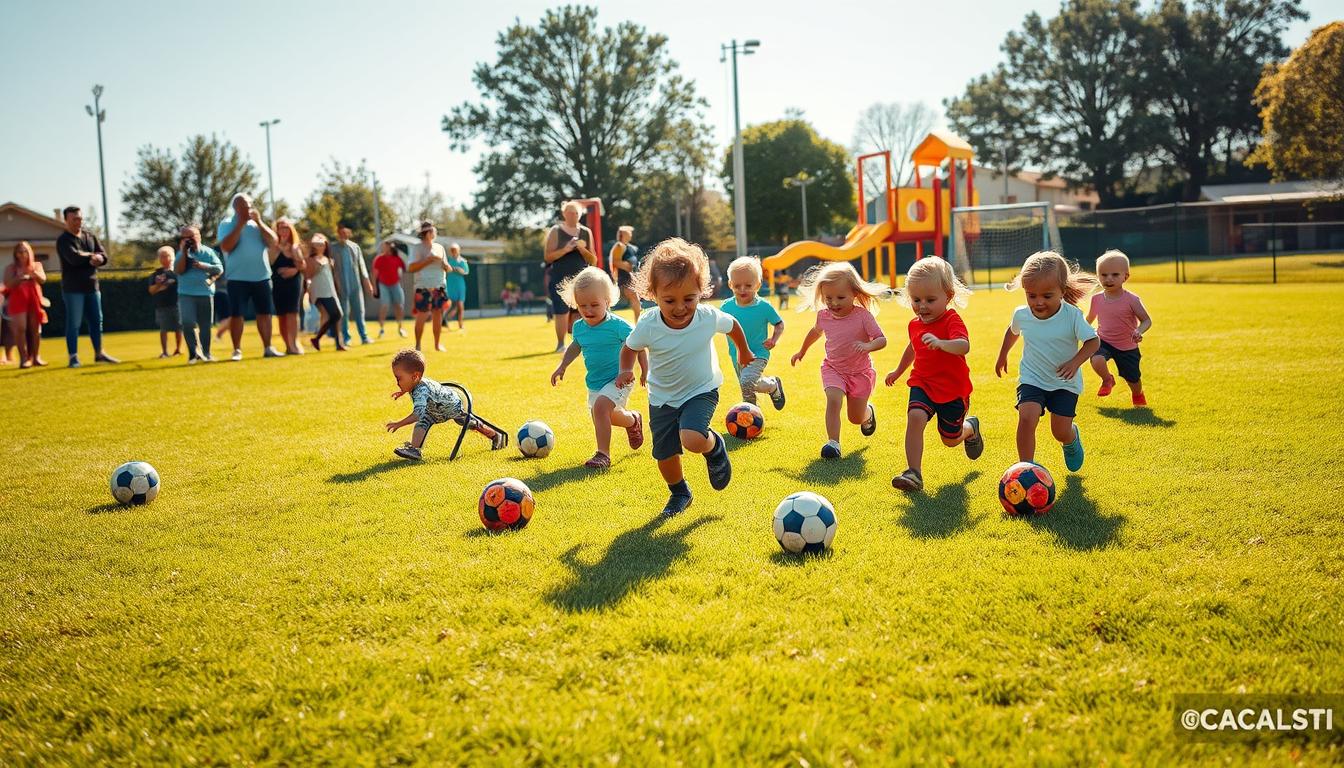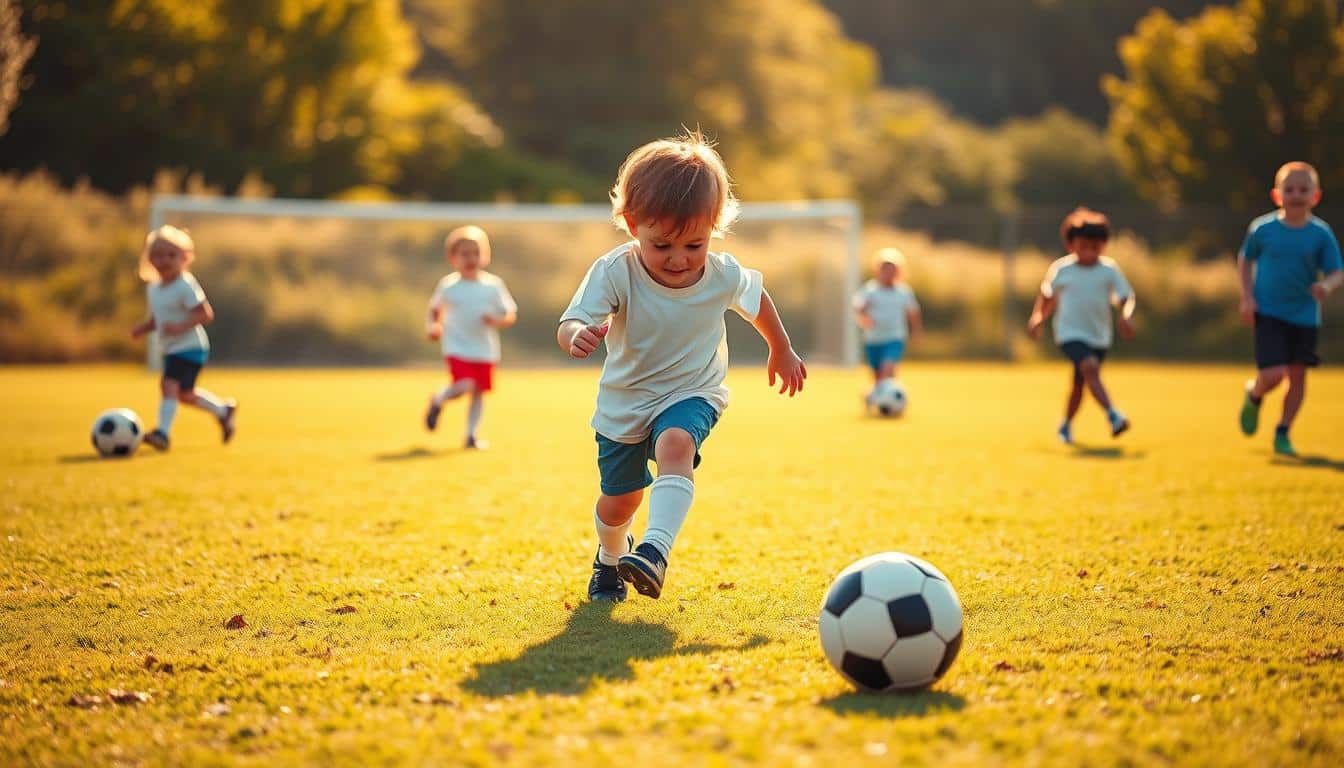10 Benefits of Soccer for Toddlers You Should Know

Ever wonder how kicking a ball could transform your little one’s growth? Soccer isn’t just a game—it’s a powerful tool for building coordination, teamwork, and confidence in toddlers. Studies from Fold-A-Goal reveal that early exposure to this sport strengthens motor control while teaching kids to collaborate. Whether they’re chasing a ball or giggling with teammates, children gain skills that last far beyond the field.
You don’t need fancy gear or a giant field to start. Simple drills at home or in a local class can spark joy while boosting balance and endurance. Research by youth coaches like Alison Kresta shows structured play helps toddlers process emotions and adapt to new challenges. Let’s explore how this accessible activity shapes young minds and bodies—one kick at a time.
Key Takeaways
- Soccer builds coordination and motor skills through dynamic movements like kicking and running.
- Team-based play encourages social skills and emotional growth in group settings.
- Early exposure to sports creates lifelong habits of physical activity and resilience.
- Simple, structured drills adapt easily to home or community environments.
- Coaches emphasize soccer’s role in developing problem-solving and focus.
Building a Strong Foundation with Physical Activity
Did you know your toddler’s daily movements shape their long-term health? Soccer provides the perfect mix of play and structured exercise to fuel growth. Running, kicking, and changing direction build physical literacy – the ABCs of movement that support all future activities.
Improving Coordination and Balance
Chasing a rolling ball teaches little ones to adjust their steps. A 2016 study in the Journal of Bone and Mineral Research found that weight-bearing exercises like dribbling increase bone density by 15% in preschoolers. Coaches like David Hauptman note how kicking drills strengthen leg muscles while improving reaction times.
Strengthening Bone Density and Muscle Growth
Three key areas where soccer impacts young bodies:
| Physical Skill | Soccer Activity | Everyday Benefit |
|---|---|---|
| Leg Strength | Kicking Practice | Climbing Stairs |
| Core Stability | Dribbling Drills | Sitting Upright |
| Hand-Eye Sync | Throw-Ins | Catching Objects |
Simple games like “Red Light, Green Light” with a ball teach stopping and starting. These movements develop the same muscles kids use when riding tricycles or carrying lunchboxes. Regular play sessions create stronger bones that handle tumbles better, according to pediatric fitness experts.
Benefits of Soccer for Toddlers: Enhancing Motor Skills and Brain Development
Watching toddlers chase a soccer ball reveals more than just play—it’s a workout for their growing bodies and brains. Research from Frontiers in Psychology shows structured physical activity like this sport strengthens both motor control and cognitive abilities simultaneously.

Developing Motor Skills Through Play
Kicking, dribbling, and changing direction build essential movement patterns. These actions improve coordination as kids learn to control their legs and feet while tracking the ball’s path. Simple fun footwork drills turn practice into games that feel like playtime.
Boosting Brain Function and Focus
Tracking a moving ball sharpens visual-spatial awareness—a skill used later in reading and math. Quick decisions during games (“Pass or dribble?”) activate problem-solving areas of the brain. Studies show children who play sports often display better concentration during classroom activities.
Increasing Endurance and Cardiovascular Health
Regular soccer play gets little hearts pumping safely. Short bursts of running followed by rest periods mimic interval training adapted for young bodies. This builds stamina that helps kids stay active longer at parks or during family outings.
Parents often notice improvements beyond the field: easier shoe-tying from refined finger movements, or calmer behavior after burning energy through play. The key? Keeping sessions joyful and pressure-free while letting natural development unfold.
Fostering Social Interaction and Life Skills
Team sports do more than burn energy—they’re practice for real-world connections. University of Michigan researchers found that children in group activities like soccer develop social skills 30% faster than those in solo play. Structured games create natural moments for sharing and problem-solving.
Building Teamwork and Communication
Passing drills teach toddlers to work toward a common goal. Coaches like David Hauptman note how saying “my turn” during practice helps kids understand boundaries. Group celebrations after goals reinforce collective achievement.
Youth programs use simple rules:
• High-fives before switching players
• Calling friends by name when passing
These habits build confidence in speaking up and listening.
Learning Emotional Control and Empathy
When a teammate falls, toddlers often pause to check on them—an early lesson in compassion. Managing frustration after missing a kick translates to calming down during bedtime struggles. Programs like SoccerTots use role-playing games where kids take turns being leaders and helpers.
A 2023 study showed children in team sports display 40% more patience during classroom transitions. The field becomes a safe space to navigate big feelings, creating emotional tools that last a lifetime.
Final Steps to Boost Your Toddler’s Experience on the Field
Ready to kickstart your child’s soccer journey? Start by finding a local youth program that matches their age and energy. Use online directories like Sawyer to filter options by location, session length, and class size. Look for coaches who prioritize play over competition—toddlers thrive in environments where giggles matter more than goals.
Check reviews from other parents to gauge how programs handle shyness or big emotions. Flexible booking options let you adjust as your child’s interests evolve. Many providers offer trial classes—perfect for testing if the vibe feels right.
Before the first session, practice simple ball-handling skills at home to build familiarity. Pack water, comfy shoes, and snacks to keep energy high. Arrive early to explore the field together, reducing first-day jitters.
Remember: early exposure to team sports builds more than muscles. It shapes how children navigate challenges, share victories, and connect with peers. Every kick, stumble, and high-five plants seeds for lifelong health and joy. Your little one might not become a pro overnight—but they’ll gain tools to thrive on and off the field.
